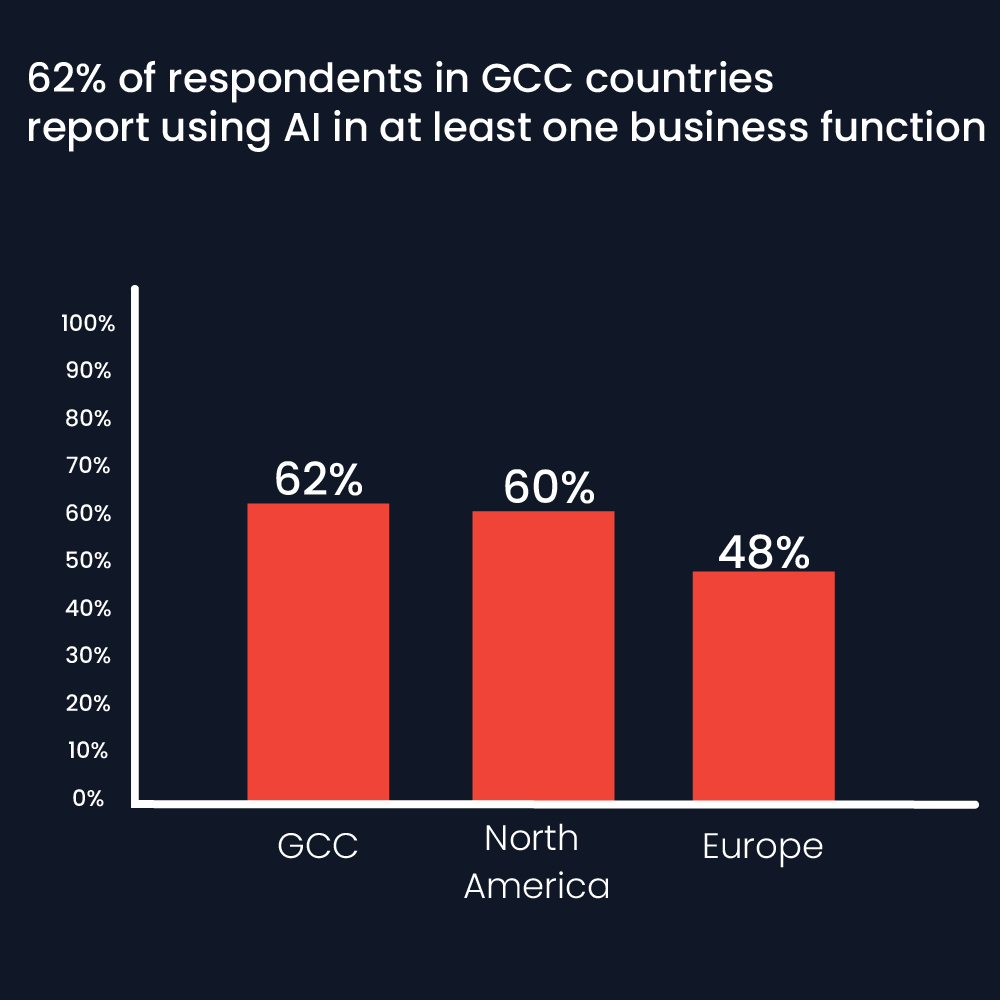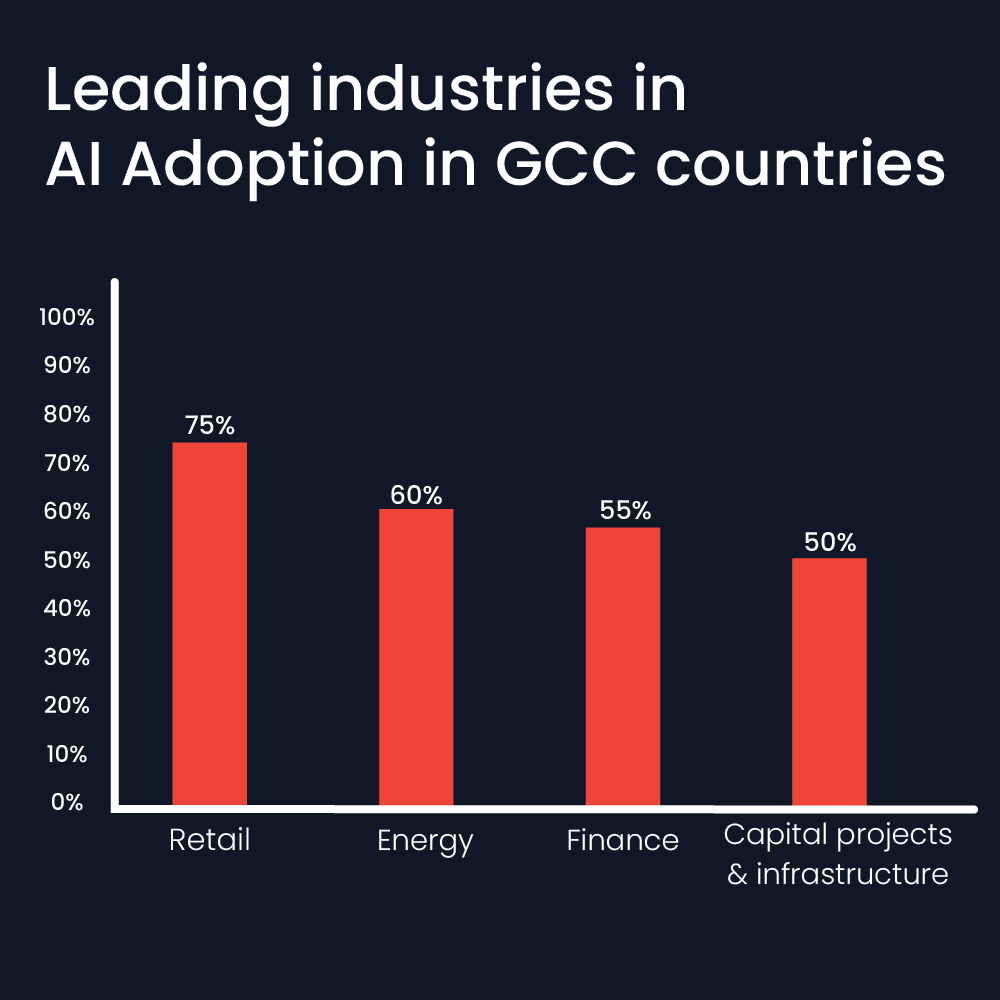AI in GCC
Dec 9, 2024 4:40:26 AM Ahmed Negouly 7 min read

Centuries ago, the Middle East’s Gulf Region was an untapped gold mine. That gold mine was in the form of gold, and everyone knows how that turned out for them. Today, the region is still a gold mine, but this time in the form of untapped AI potential. AI is the new digital oil of the Middle East and the GCC.
The Gulf Cooperation Council (GCC), which consists of Bahrain, Kuwait, Oman, Qatar, Saudi Arabia, and the United Arab Emirates, are on a long overdue path to dominating the AI field, just as they have done every other industry.
Background
The GCC have been quick to jump on the AI bandwagon right from the start. Ever since the launching of ChatGPT in 2022, the whole world has been full of excitement to the potential of generative AI, especially in financial fields.
It is definitely a smart move on their behalf to do that, since according to McKinsey research, generative AI could deliver a staggering $150 billion to the GCC.
Countries such as the UAE and Saudi Arabia have been investing heavily into AI ever since before the launching of ChatGPT. The only issue, however, is that not everyone gets just how artificial intelligence is meant to work.
The saying “work smart, not hard” has been around for a reason. GCC countries have been pumping in billions of dollars worth of investments into AI and data research, but little businesses have been reaping the full benefits.
AI is not just a switch or command that you activate and let it handle your business. It is just like any other software you are developing. You would need proven experts training it to fit your exact needs and specific business requirements.
The successful applications in the GCC are not as prevalent as you might think, and that’s why there is a huge opportunity in the market. With the right direction, the GCC will completely transform into a new digital golden age that they did not think was possible since the oil revolution.
Examples
Careem
One of the most known successful applications of AI within the GCC countries is Careem. Careem is a Dubai based company that was bought by Uber.
Careem deployed AI across the region and reported that it had successfully blocked 35 thousand fraudulent users from the platform that were trying to scam the payments and deliveries. This is a success story because of one simple reason. Careem had deployed AI and trained it specifically to handle its fraud prevention systems, and not just have AI do everything for them.DEWA
Another example is by the government itself. The Dubai Electricity and Water Authority reported that almost 7 million queries were answered through their very own AI virtual assistant.
Aramco
Saudi Arabia’s Aramco reported that they have reduced flare emissions by 50% by using AI to monitor conditions and take preventative action.
Initial Challenges
Before you take a deeper look into it, you might wonder why the Middle East isn't at the top of their game when it comes to adopting AI in the GCC. I mean, the stats suggest otherwise. In fact, 62% of 119 senior executives within the GCC reported that AI is being used in at least one business function in their companies.

Credit: Mckinsey
So what’s the hurdle then? Well, when you break it down it simply just comes down to…data.
Most sectors within the GCC, specifically in construction, are either unable to collect the data required to train an AI model, or do not have the knowledge and expertise to to use what they have to build their own AI systems.
It is more evident that data is the issue because the fastest AI adopters and the ones using it most successfully are companies in the retail industry. The reason for that is because retail companies had already been collecting huge amounts of data for decades.
This data is essential to learn more about consumer insights and to build marketing strategies for them. So now, all they had to do was find the right talents to build their AI for them with this data.
These challenges have resulted in a broader more general use of AI for most companies within the GCC, which then results in limited success. In fact, research suggests that with the growing market for AI in the GCC, companies that have been using AI have barely scratched the surface to the potential of what they can accomplish.
Executives have reported that AI has mainly been used in GCC industries for marketing and sales, but not many are actually using advanced machine learning AI models, which leaves a lot of untapped potential on the table.
There is also a struggle to find proven AI talents in the region, considering the demand is relatively new and not many teams have proven track records. There is a considerable demand for technical talents, data scientists, and AI engineers, but there are not that many qualified technical talents, data scientists, or AI engineers.
Credit: McKinsey
New Age of AI in GCC
But now while the challenges may seem severe, the GCC are on a rising slope towards AI advancement. The potential has been realized by the area and a lot of investments have been made. They realize that just one function in generative AI can generate the GCC around $5 to $8 billion per year.
A lot is being invested in training or finding tech teams to properly build companies the AI systems they need. In fact, Saudi Arabia has invested around $20 billion in data and AI, and aims to create 300 startups within the field.
They have set a goal to be met by 2030. The GCC nations are also investing a lot in summits and events that not only raise awareness, but bring in new opportunities to grow in the AI field and advance their countries.
Saudi Arabia and the UAE for example, have both launched programs to train their workers on adopting generative AI. They have realized the value of investing in your work force, especially in the hottest thing in the world since the invention of the wheel.
GCC AI Country Visions
Now, each GCC countries have their very own vision when it comes to AI adoption.
Bahrain
Bahrain’s government has introduced guidelines which aim to promote the responsible and ethical use of AI solutions across its government agencies.
This framework hopes to provide transparency, security, and privacy, allowing the public to build trust and confidence in the deployment of AI, so that the entire nation can reap the benefits.
Kuwait
Kuwait’s government has enlisted Microsoft long ago in 2019 in a strategic partnership. They had hoped to train government officials to be able to effectively leverage AI and understand the technology.
Kuwait hopes to ready its workforce and provide workshops and training programs to provide the skills needed for a digital transformation and AI revolution. This would allow them to enter a new era of efficient delivery as well as more rewarding decisions.
Oman
Oman has expressed their desire to build AI powered smart cities. In February 2020, the Ministry of Technology and Communications partnered with Gulf Business Machines as well as the Research Council.
The aim of this partnership is to create initiatives to enhance traffic management, optimise water efficiency, and improve waste management through AI-driven solutions. Oman hopes to build sustainable urban environments that optimizes resources and is efficient, clean, and advanced for their citizens' well being.
Qatar
Qatar has long hoped to integrate AI into areas such as healthcare, education, and transportation. These are all areas that impact their citizens’ quality of life. They had launched their National Artificial Intelligence Strategy to create comprehensive strategy outlines to implement their vision.
Qatar hopes to improve service delivery and stimulate economic growth. They would also focus on nurturing local AI talent and host international collaborations to position themselves as a regional AI hub.
Saudi Arabia
Saudi Arabia has established the Saudi Data and AI Authority (SDAIA) in 2019. It is a new governing body responsible for developing and implementing Saudi Arabia’s AI strategy. Saudi Arabia hopes to implement AI in academia, industry, as well as the public sector. The aim is to stimulate a diverse economy and create more job opportunities, while addressing their challenges in implementing AI technologies.
United Arab Emirates
The UAE has a National Strategy for AI for 2031. They had previously established the Ministry of AI, and had taken initiatives to integrate AI into various sectors, focusing most on healthcare, transportation, and education. The UAE hopes to implement AI into government services and to drive economic growth. They have also emphasized the importance of investing and developing AI talents of their own rather than rely on outside help.
Future of AI in GCC
The future of AI in the GCC is bright. It is the new digital oil of the region. With so much untapped potential, surely everyone is aiming to come rushing in to take part in this gold rush.
The GCC are certainly ambitious, and have taken the right steps to bring about the new age and full potential of AI in their countries. By implementing national strategies and making strategic collaborations in the digital transformation, they set their course to reap billions of dollars as a result of this investment.
For any business owner out there, if you are not correctly implementing AI for your business, you are going to fall behind. The GCC is coming in hot, and you should hop on board the train before it sails away. This is your chance to claim the oil before it is taken away.
You can start by booking a free consultation to discuss the potential of adopting AI for your business.